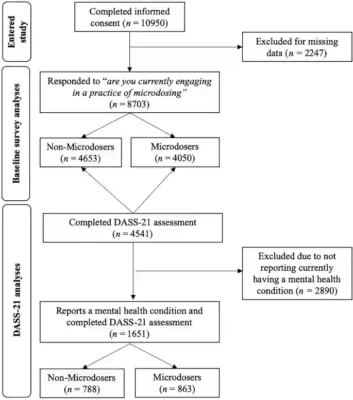Uncategorized
Adults Who Paper Microdose Psychedelics Report
An Overview of Psychedelic Microdosing
In recent years, there has been growing interest in the practice of psychedelic microdosing. This involves taking very small amounts of a psychedelic substance, such as LSD or psilocybin, with the aim of achieving subtle cognitive enhancements and improvements in mood and well-being. While the practice remains controversial and not well-researched, there is a growing community of individuals who swear by its benefits. In this article, we’ll take a closer look at the reported benefits of microdosing psychedelics, based on anecdotal evidence from adult users.
What is Microdosing?
Microdosing involves taking very small amounts of a psychedelic substance on a regular basis. The doses are typically much lower than what would be taken for a full-blown psychedelic experience, and are often below the threshold for producing any overt psychoactive effects. The practice is usually done over an extended period of time, with doses taken every few days or once a week.
The Reported Benefits of Microdosing
While there is little scientific evidence to support the benefits of microdosing, many individuals report a range of positive effects. Some of the most commonly reported benefits include:
- Improved mood and well-being
- Increase in creativity and productivity
- Improved focus and concentration
- Reduced anxiety and depression symptoms
- Enhanced spirituality and sense of connectedness
- Improved social interactions
The Risks and Concerns of Microdosing
While many individuals report positive effects from microdosing, there are also potential risks and concerns to consider. One major concern is the lack of regulation and quality control of the substances being used. It can be difficult to ensure that the doses are consistent and free from contaminants, which could lead to unintended side effects. Additionally, the long-term effects of microdosing are not well-understood, and there is a risk of developing tolerance to the substances over time.
The Paper Microdosing Experiment
One of the most interesting studies on the effects of microdosing was conducted by a group of researchers at Imperial College London, who published their findings in the journal Psychopharmacology in 2019. The study involved 98 participants who were self-reported microdosers of LSD or psilocybin. The participants completed a series of questionnaires and cognitive tasks, both on days when they microdosed and on days when they did not.
The Findings of the Study
The study found that microdosing was associated with a range of positive effects, including improvements in mood, creativity, and focus. However, the effects were relatively small, and were not consistent across all participants. The researchers also noted that there were no significant differences in cognitive performance between the microdosing and non-microdosing days.
Limitations of the Study
While the Imperial College study provides some interesting insights into the effects of microdosing, it is important to note its limitations. Firstly, the study relied on self-reported data, which could be subject to bias and inaccuracies. Additionally, the study did not include a control group of non-microdosers, making it difficult to determine whether the reported effects were actually due to the microdosing, or were simply the result of placebo effects or other factors.

Other Anecdotal Reports
While the Imperial College study is one of the most rigorous investigations into the effects of microdosing, there are many anecdotal reports from individuals who have experimented with the practice. These reports offer a more personal and subjective perspective on the potential benefits and risks of microdosing.
Improved Mood and Well-being
Many individuals report that microdosing has helped to improve their overall mood and well-being. Some users describe feeling more optimistic, energized, and motivated on days when they microdose. Others report feeling more relaxed and less anxious, or experiencing a greater sense of calm and contentment. Some users also report improvements in their sleep quality and overall physical health.
Increase in Creativity and Productivity
Another commonly reported benefit of microdosing is an increase in creativity and productivity. Some users describe feeling more inspired and able to think outside the box, while others report being able to focus more effectively on their work or creative pursuits. Some users even claim that microdosing has helped them to overcome creative blocks and achieve breakthroughs in their work.
Improved Focus and Concentration
Many microdosers report improvements in their ability to concentrate and stay focused on tasks. Some users describe feeling more alert and engaged, while others report being able to sustain their attention for longer periods of time. Some users even report improvements in their memory and cognitive function.
Reduced Anxiety and Depression Symptoms
One of the most exciting potential benefits of microdosing is its ability to reduce symptoms of anxiety and depression. Some users report feeling less anxious or depressed on days when they microdose, while others report experiencing a greater sense of emotional resilience and stability. While these effects are not consistent across all users, they offer hope for those who are struggling with these common mental health issues.
Enhanced Spirituality and Sense of Connectedness
Another interesting effect of microdosing is an enhanced sense of spirituality or connectedness. Some users report feeling more in touch with their emotions and their inner selves, while others describe feeling a greater sense of connection with the world around them. Some users even report experiencing mystical or spiritual experiences while microdosing.
The Future of Microdosing Research
While the benefits and risks of microdosing remain controversial and not well-understood, there is growing interest in further research on the topic. In recent years, several studies have been conducted on the effects of microdosing, and more are likely to follow in the coming years.
The Importance of Rigorous Scientific Research
It is important to note that while anecdotal reports can provide valuable insights into the effects of microdosing, they are not a substitute for rigorous scientific research. Properly controlled studies are needed to determine the safety and efficacy of microdosing, and to identify any potential risks or side effects.
The Potential for Microdosing as a Therapeutic Intervention
One of the most exciting potential applications of microdosing is as a therapeutic intervention for mental health issues such as anxiety, depression, and PTSD. While more research is needed to determine its safety and effectiveness, early studies have shown promising results. Some researchers are even exploring the possibility of using microdosing as a treatment for addiction.
Conclusion
While the practice of microdosing psychedelics remains controversial and not well-researched, there is a growing community of individuals who swear by its benefits. Anecdotal reports suggest that microdosing may offer a range of positive effects, including improvements in mood, creativity, and focus, as well as potential therapeutic applications. However, more research



